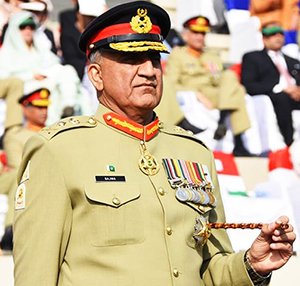Washington/Islamabad, Feb 10: Pakistan is committed to countering "all militant groups" operating within its territory, army chief General Qamar Javed Bajwa has assured US Defence Secretary James Mattis during their first telephonic conversation.
Gen (retd) Mattis reaffirmed the importance of bilateral military relationship during his conversation with Pakistan's Chief of Army Staff, the Pentagon said. "Gen Bajwa reiterated Pakistan's commitment to counter all militant groups operating in its territory," Pentagon Spokesman Capt Jeff Davis said.
"Mattis recognised the significant sacrifices the Pakistan military has made in the Federally Administered Tribal Areas, and expressed appreciation for the Pakistan military's recent support for efforts to defeat ISIS-Khorasan Province," he said.
"Both leaders reaffirmed the importance of the bilateral military-to-military relationship, and highlighted the importance of continuing to work together on counter-terrorism and regional stability," Davis said.
Pakistan Army spokesman Major Gen Asif Ghafoor said in a statement that General Bajwa and Secretary Mattis "had a twenty minutes telephone conversation".
He said they reaffirmed the commitment towards the common goal of peace and stability in the region and discussed measures towards that end. Bajwa and Mattis also agreed on continued engagement at multiple levels.
"Secretary Mattis commended the sacrifices and resilience of the people and armed forces of Pakistan and appreciated the role Pakistan Army has played in battling the scourge of terrorism," Ghafoor said.
The army chief also congratulated the Secretary on his assumption of new responsibility and expressed the hope that his vast experience in the field will be of great value to the region, Ghafoor said.
Pakistan has been trying to establish a rapport with the new administration but so far without much success.
Prime Minister Nawaz Sharif's close foreign policy aide Tariq Fatemi had visited Washington in December but could not meet any top official of then president-designate.
The only high-level contact so far between the two sides was a brief telephonic talk between Trump and Sharif, who had called the former to congratulate him after his electoral triumph.
The call became controversial after its transcript was issued by Pakistan. It is believed that Mattis knows Pakistan well as he served as head of the US Central Command and has been to the country many times.
In his confirmation hearing before the Senate, Mattis had emphasised on remaining engaged with Pakistan.
General John Nicholson, who leads the US and international forces in Afghanistan, has called for a "holistic review" of the relationship with Islamabad.






Comments
Add new comment